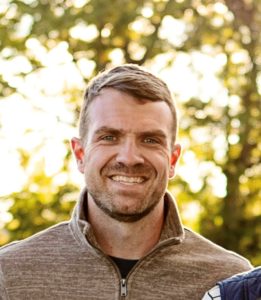Lucas Marshall – Alumnus Spotlight
 Director of R&D at Aegis Sciences Corporation
Director of R&D at Aegis Sciences Corporation
Hometown: Fayetteville, TN
BS in Forensic Chemistry (2005)
When and why did you decide to major in forensic chemistry?
I distinctly remember the day I knew I wanted to learn more about forensic science. I was a junior in high school and was torn between being a journalist or an accountant. I was sitting in my required chemistry class and my teacher, Mrs. Smith, showed us an episode of the HBO documentary series Autopsy, which followed some cases of Dr. Michael Baden. In this particular case, a victim had been decomposing for quite a while in a bathtub, which made it more challenging for the ME to determine cause of death. Maggots were present, however, and they analyzed those and determined it was a drug overdose that had killed the person. I thought their analytical approach was the coolest thing and I was hooked.
Please share some significant accomplishments or favorite memories from your time at UM.
As a member of the Ole Miss Forensic Chemistry program, I was fortunate to get a lot of instrument exposure with Dr. Godfrey and Dr. Scott. It really prepared me to take on any analytical chemistry job, not just one specifically in a crime lab. I tell people all the time that although my degrees are in Forensic Chemistry, I’m really just an analytical chemist. I could do anything where analysis is involved. Having exposure at Ole Miss to a wide array of instrumentation really prepared me to have confidence in graduate school and eventually the workforce. I also had a great experience at my internship and was able to complete a research project in the field, which really uncovered my love for research and method development, which is the area I currently work in.
Describe your educational/career path since graduation.
After I graduated from Ole Miss, I obtained my Master’s in Forensic Chemistry at Michigan State University, where I completed a research thesis on Chemometric Analysis of Diesel as an Accelerant using GC-MS. From there, I have worked in Research and Development for the last 14 years at Aegis Sciences Corporation in Nashville, TN. Aegis is a full-service toxicology lab focusing in health care toxicology and other areas.
I am currently the Director of R&D at Aegis. Our group is responsible for developing and implementing new or improved assays for the laboratory, as well as evaluating new technologies and other innovation to improve quality and efficiency of the analytical process. We primarily do mass spectrometry analysis, but utilize other technologies as necessary.
What is the value of studying forensic chemistry in today’s world?
As a person who hires new scientists, a Forensic Chemistry degree is incredibly value. As a hands-on focused program, the exposure to using instrumentation is invaluable. Understanding the analytical process from beginning to end – how to receive and prepare samples, load samples on the instrument, and review and report data – is critical knowledge for any chemistry job. One of the bonuses of Forensic Chemistry is the added piece of learning how to testify. Even though that part is specific to crime lab jobs, the ability to understand and talk about your data clearly to non-scientists is important. In industry, we have to work with other non-scientific departments and ensure they understand the scientific workflows and needs to help the business run smoothly all around.